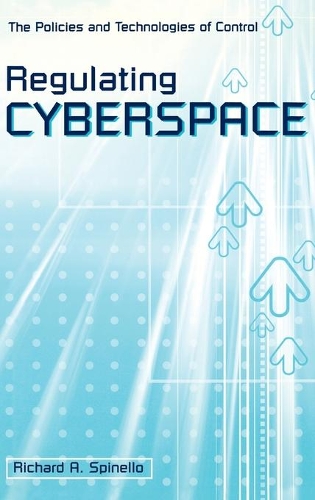
Regulating Cyberspace: The Policies and Technologies of Control
(Hardback)
Publishing Details
Regulating Cyberspace: The Policies and Technologies of Control
By (Author) Richard A. Spinello
Bloomsbury Publishing PLC
Praeger Publishers Inc
30th June 2002
United States
Classifications
Tertiary Education
Non Fiction
Digital and information technologies: social and ethical aspects
303.4833
Physical Properties
Hardback
264
Description
Provides a comprehensive view of the ongoing struggle between private organizations and government to regulate Internet commerce and communications, arguing that costly government intervention in cyberspace can be minimized as long as the private sector prudently assumes its share of responsibility. This visionary book presents an interdisciplinary and cogent approach to the issue of Internet governance and control. By examining five critical areas in which the tension between freedom and control is most palpable--fair competition and open access, free expression, intellectual property, privacy rights, and security--Spinello guides the reader on a tour of the emerging body of law and public policy that has attempted to control the anarchy of cyberspace. In so doing, he defends the credo of Internet self-regulation, asserting that the same powerful and flexible architectures that created the Internet as we know it today can be relief upon to aid the private sector in arriving at a workable, decentralized regulatory regime. Except in certain circumstances that require government involvement, self-regulation is not only viable but is a highly preferred alternative to the forced uniformity that centralized structures tend to impose. Beginning with an exploration of the Internet's most important values, including universality, free expression, and open access, as well as its promise as a democratizing force, Spinello considers how we can most effectively preserve those values and fulfill that promise while curtailing the social harms that vex Internet users. How do we arrive at the right mixture of technology and policy so that the Internet does not lose its promise as a liberating technology In examining this question, Spinello evaluates such architectures of control as filters and rights management protocols, which attempt to keep out unwanted information and protect intellectual property, respectively. He explores how these and other technologies can be designed and used responsibly so that online social order can be sustained with a minimal amount of government intervention. For policymakers, lawyers, and scholars of Internet law and cyberethics.
Reviews
Spinello closely examines Internet regulation, focusing on five key areas: fair competition and open access, free expression, intellectual property, privacy rights, and security. He takes an in-depth look at the debate in each of these areas, sorting through and clearly articulating the multitude of issues....this book is an excellent, comprehensive resource providing valuable insight. General readers; lower-division undergraduates; professionals.-Choice
"Spinello closely examines Internet regulation, focusing on five key areas: fair competition and open access, free expression, intellectual property, privacy rights, and security. He takes an in-depth look at the debate in each of these areas, sorting through and clearly articulating the multitude of issues....this book is an excellent, comprehensive resource providing valuable insight. General readers; lower-division undergraduates; professionals."-Choice
Author Bio
RICHARD A. SPINELLO is Associate Research Professor at the Carroll School of Management at Boston College. Prior to joining the faculty of Boston College, he worked as a programmer, consultant, and marketing manager in the software industry. He has written and edited four books on computer-related ethics as well as numerous articles and scholarly papers on ethics and management.
